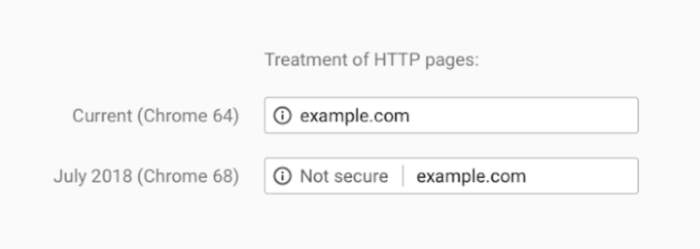Have you been subject to getting that scary red ‘not secure’ warning when people land on your website? If you’ve been wondering why that keeps happening to you, we’re here to tell you its because its time to make the switch to https. Changes have already been put in motion that will make staying on HTTP a drain on your brand. Don’t hesitate to start the switch to https.
Why You Should Switch to https to Build Brand Trustworthiness
Making the switch to https can feel daunting and unnecessary, but that is far from the case. Https has many great features to offer your brand that HTTP can’t keep up with. Staying loyal to HTTP will do nothing to benefit your brand. However, if you switch to https it can make a significant impact on your visibility. It will also affect your level of trustworthiness with your viewers.
https Provides Greater Security
The first way that https is different from HTTP is that it transmits data over the Secure Sockets Layer (SSL). This feature ensures that you send encrypted data through the transmission. SSL also makes sure that your data becomes decrypted when received by the site’s server or the user’s browser. This makes it impossible for any third party to intercept your information.
Https also provides trustworthy servery authentication. This is complete with a certification that hackers will not be able to hack and that you will be talking to the right server.
There are some sites that have decided to straddle the threshold between HTTP and https, making some of their sites one and some the other. Sometimes they even present all their HTML documents in https but load their other resources over HTTP. This is unconscionable because it creates the risk of exposing sensitive user information. Making your whole site in https is the easiest way to protect against this risk.
Internet technologists have always known that HTTP is insecure, causing many risks to users. Because HTTP traffic is unencrypted, any data sent over HTTP can be read and modified by anyone who has access to the network. As revealed by the Snowden NSA surveillance documents, HTTP traffic can also be collected and searched by government agencies without notice to users or webmasters. Given these risks, EFF believes that every website should support HTTPS on all pages as soon as possible.
Splitting Your Presence Across Two Protocols Taxes Your Servers
The idea of presenting individual pages on your website in HTTP and other pages in https can feel like a rational decision. However, it will make your site’s server fire a 301 redirect every time a requested page is in the wrong protocol. This is a drain on the server to be able to maintain. Consequently, it will slow page loads every time one of these redirects has to fire.
Splitting Your Presence Confuses Google

If you choose to run specific pages in HTTP and other pages in https, you’re required to manage the entire site in both HTTP and https. You’ll also have to maintain careful and precise control over the redirects that happen to serve the different versions of each page to each user.
This is a perilous place to be in. Your site could accidentally let one or more of its pages resolve into both protocols. This will result in two versions of one page being crawled and indexed by Google. This will lead to negative search visibility for the page. This is because Google will see the two versions as competing with each other.
Even if you’re able to avoid this risk, Google will sometimes still index the incorrect versions of individual pages. This usually happens to the ones with the wrong protocol. This will require unnecessary redirects for your users that click through from search results. Additionally, this creates superfluous server strain, will slow page loads and will dilute search authority.
Switch to https for SEO
Google was very open when it announced in 2014 that it would reward pages that were secured by https with higher rankings in the search results. It took until the spring of 2015 for these threats to become a reality. However, now there is a definite correlation between https and higher rankings.
Additionally, there is every reason to believe that you will rank better in Google organic search on the competitive keywords you’ve been dying to use if your site is in https.
SEE ALSO: How to Use Local SEO to Grow Your Business
Google Thinks https is Higher Quality
If your site is a ‘your money or your life’ (YML) site, its held to a higher quality standard. This means it will be expected to offer better security.
Another big thing Quality Raters look out for are what Google calls Your Money or Your Life (YMYL) pages – pages with the potential to impact the future happiness, health, or financial stability of a user. Quality Raters hold YMYL pages to a higher standard than other pages on the web; Google takes potential risks to people’s health or finances very seriously. Any page with health- or finance-related advice or information could be considered a YMYL page – as could any page from which users might potentially input credit card information to make a purchase.
You read that right: if you have an ecommerce site, you’re considered a YMYL site. That means striving for the highest-quality pages possible is even more important if you’re selling anything on your site (or if you’re giving health advice).
Knowing that mixed-protocol sites have a higher vulnerability if you place your whole site in https will indicate more strongly to Google that your site takes user security seriously. It would thus improve Google’s assessment of the authority of your website which will lead to superior search visibility.
https is a Prerequisite for AMP
AMP (accelerated mobile pages) is an open-source initiative that allows webmasters an easy way to create lightweight versions of your mobile pages that can load faster than average. This feature can boost your site’s visibility in mobile organic search. However, unless your site is only available in https, it will not be eligible for AMP privileges.
Additionally, being in https is a prerequisite for using the http/2 protocol. This is relatively new but is expected to grow in the coming years. This is because of the massively increased speed that is created by its ‘multiplexing’ technology. It consequently dramatically reduces page load times and latency. If you haven’t switched your site to https, then you won’t be ready to take full advantage of this coming feature.
https Ensures More Accurate Transmission of Referrer String Data
If your site is mostly in HTTP, it’s usually denied access to referrer string data on visits to sites in https.
This isn’t because it’s a particular objective of https sites, but reflects the cautiousness of https sites. They are often cautious to a fault about the identifying information that is insecure on HTTP sites. They also acknowledge that any outgoing referrer strings can become casualties because of their association.
The consequent problem is that many referral visits to HTTP sites will end up as wrongly classified direct visits in the site’s analytics. By switching over entirely to https, you’ll have fewer referrer strings dropped, and your site’s analytics will be more accurate.
Chrome Will Mark HTTP Sites as ‘Not Secure’
Currently, Chrome displays a neutral information icon on HTTP sites, but starting with version 68; Chrome will warn users with an extra notification in the address bar. Already Chrome has marked https-encrypted sites with a green lock icon and a ‘secure’ sign to make users feel safer.

This change has been brought on by the increased rate of https adoption. Currently, 81 of the top 100 sites on the web default to https. This means that a substantial majority of Chrome traffic already encrypted. Chrome feels that by July of this year the balance of https sites will be tipped enough that they will be able to mark all HTTP sites.
The https has built-in encryption that protects the channel between your browser and the website your visiting. This is important for making sure no one can show up in the middle and tamper with or spy on what you’re doing. On an HTTP site, someone with access to your router or ISP could intercept any of the information you send to websites. They could even inject malware into otherwise legitimate pages.
The good thing is that https has become much more comfortable to implement thanks to automated services. This gives sites even fewer excuses to not adopt it.
Final Thoughts
If you’ve been thinking about making the switch to https, now is the time to do it. You know that sticking with HTTP may take viewers away from you and decrease how much they’re willing to trust you, so why would you stay loyal to it? Https is the way of the future. Google Chrome has already determined it to be a favorite of theirs. It should quickly become the same for you.
What has kept you from making the https switch?











